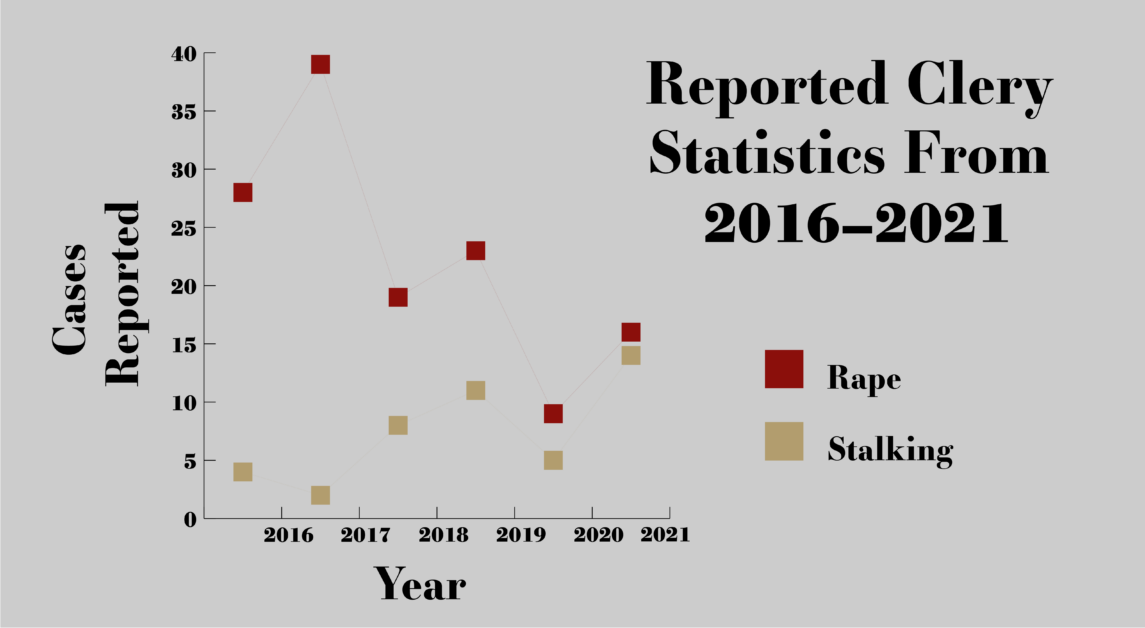Boston College reported 16 rape cases in 2021, according to the University’s Annual Campus Security and Fire Safety Report, marking an increase from the nine reported offenses in 2020 but still not surpassing the 23 reported offenses in 2019.
The University published its crime statistics in accordance with the Clery Act, which requires all colleges that receive federal funding to release an annual public safety report detailing crime on campus and the school’s efforts to improve campus safety by Oct. 1 of each year.
Associate Vice President for Student Health and Wellness and then-University Title IX Coordinator Melinda Stoops noted last year that the historically low number of reported rape offenses in 2020 could be due to the COVID-19 pandemic.
“We have fewer people on campus, and with COVID measures, fewer gatherings or cases where we might see some activities that sexual violence may be more likely to occur,” Stoops said. “So our numbers were down and I think that makes sense given the context of the year.”
In 2021, students returned to campus, coinciding with BC’s rise in rape offenses and liquor and drug law violations—disciplinary referrals for liquor law violations rose from 646 in 2020 to 868 in 2021 and disciplinary referrals for drug law violations rose from 45 in 2020 to 103 in 2021.
Other offenses listed in the report include stalking—which increased from five reported offenses in 2020 to 14 in 2021—and fondling—which decreased from 13 reported offenses in 2020 to 11 reported offenses in 2021.
BC also recorded three burglaries, one motor vehicle theft, one domestic violence offense, and four cases of dating violence.
The University reported no hate crimes, arsons, murders or manslaughters, robbery, aggravated assault, or arrests for weapons law violations in 2021, according to the report.
The public safety report is compiled from BC police logs, reports of campus security authorities, responses from public police agencies, and the database of the Office of the Dean for Student Development and Residential Life, the report said.
The offenses in the report include those that occur on campus, at non-campus properties, and on public property. Though in 2021, Stoops said the offenses listed in the report mostly occur on campus because the Clery Act has strict criteria for what qualifies as a non-campus offense.
According to the report, 13 of the 16 reported rape offenses occurred at on-campus housing facilities and nine of the 11 reported fondling offenses occurred at on-campus housing facilities, but only five of the reported 14 stalking cases occurred at on-campus housing facilities.
The report also listed five fires that occurred in BC housing in 2021. The causes of the fires—which occurred in Gabelli Hall, the Mods, St. Thomas More Apartments, and Vanderslice Hall—were cooking-related, the report said. One of the five fires left $2,135 in damages, while the others caused no property loss.
The report also detailed the University’s Campus Sexual Violence Response and Misconduct Prevention Program, including confidential resources for students such as the BC Sexual Assault Network
“Sexual violence or sexual misconduct of any kind is antithetical to the mission of Boston College and the values it espouses and will be responded to accordingly,” the report reads. “The University strives to eliminate sexual misconduct on campus, prevent its occurrence, and address its effects.”
If you or anyone you know has experienced sexual assault or sexual violence, you can reach out to BCPD at 617-552-4444, the Sexual Assault Network at 617-552-2211, the SANet Care Team at 617-552-8099, and the Office of Student Conduct at 617-552-3470.



















